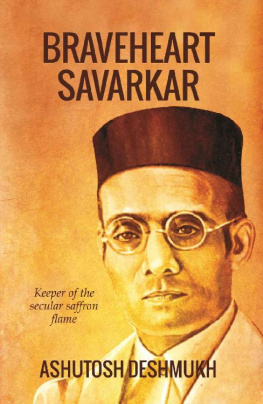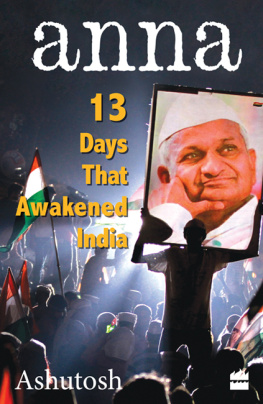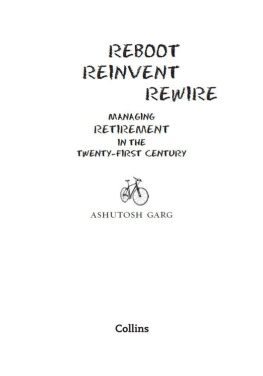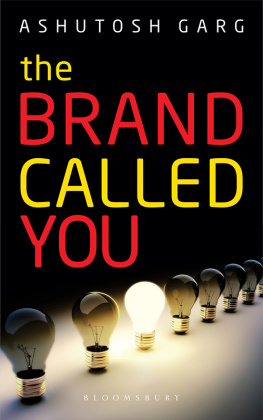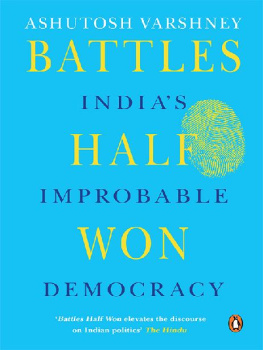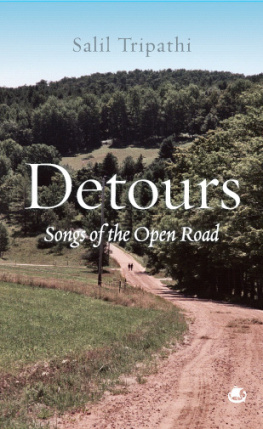Ashutosh Salil - Being the Change
Here you can read online Ashutosh Salil - Being the Change full text of the book (entire story) in english for free. Download pdf and epub, get meaning, cover and reviews about this ebook. year: 2022, publisher: HarperCollins India, genre: Non-fiction. Description of the work, (preface) as well as reviews are available. Best literature library LitArk.com created for fans of good reading and offers a wide selection of genres:
Romance novel
Science fiction
Adventure
Detective
Science
History
Home and family
Prose
Art
Politics
Computer
Non-fiction
Religion
Business
Children
Humor
Choose a favorite category and find really read worthwhile books. Enjoy immersion in the world of imagination, feel the emotions of the characters or learn something new for yourself, make an fascinating discovery.

- Book:Being the Change
- Author:
- Publisher:HarperCollins India
- Genre:
- Year:2022
- Rating:3 / 5
- Favourites:Add to favourites
- Your mark:
- 60
- 1
- 2
- 3
- 4
- 5
Being the Change: summary, description and annotation
We offer to read an annotation, description, summary or preface (depends on what the author of the book "Being the Change" wrote himself). If you haven't found the necessary information about the book — write in the comments, we will try to find it.
Being the Change — read online for free the complete book (whole text) full work
Below is the text of the book, divided by pages. System saving the place of the last page read, allows you to conveniently read the book "Being the Change" online for free, without having to search again every time where you left off. Put a bookmark, and you can go to the page where you finished reading at any time.
Font size:
Interval:
Bookmark:
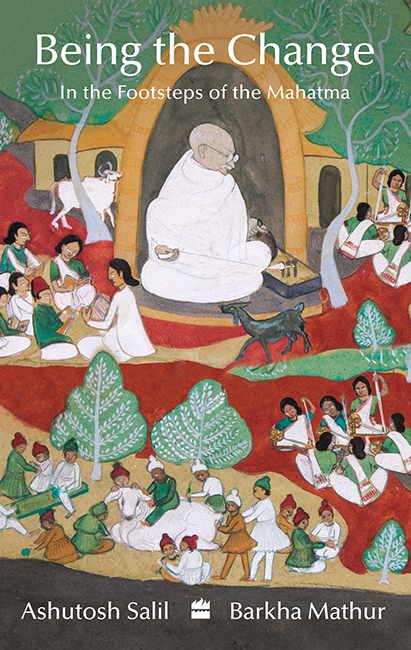

To
My lovely parents Meena and VijaySalil
My mother Usha, who taught me to writeBarkha
Contents

W e are both in professions of service to people, albeit in our own waysone of us is a bureaucrat and the other a journalist. For the both of us, each day brings a new blur of people and faces we meet, work with and for.
Among the many, many people we regularly come across, the ones that have stayed on in our minds are not the rich and the powerful, or even the talented or the successful. The ones that have stayed on in our consciousness, invariably, are the ones doing selfless workthose working for the uplift of others.
We are not talking of social work. We are talking about being the change we want to see in the world. Of making ones life ones messagethe teachings of Mahatma Gandhi that are increasingly becoming relics in the maddening machinery of modern life.
One of usthe bureaucratfelt the need to document the lives of a few such extraordinary individuals. The otherthe journalisthas covered most of them in the course of her work spanning two decades. Both of us decided to put together a book on the lives and works of some such people in Vidarbha, largely the eastern region of Maharashtrabecause it is our own karmabhoomi (place of work), because it is also fertile ground for social movements and has a deep connection with Mahatma Gandhi.
As we discussed the project, it became clear that both of us had the same objectivewe have both always felt that the stories of these men and women needed to travel beyond the geographical boundaries of where they live and work.
After a couple of e-mail exchanges, we picked seven such stories from a formidable list of eleven. The selections were made on the basis of the impact of their work, and the lives these individuals had been able to touch and change for the better.
Between July and November 2019, we travelled across Vidarbha to meet our heroesand sheroesand hear their stories. The process of putting the material together for the book was fulfilling. It gave us a sense of what selfless service really meansit helped us understand how much can be achieved through perseverance and resilience, and most importantly, it reaffirmed how timeless and perennial Bapus teachings are.
Besides bringing out the stories of service to mankind, the purpose of this book is also to underline how relevant Mahatma Gandhi and his teachings remain even in the new millennium. How, by following his path, ordinary people can still make a difference to the lives of those who do not get our attention.
We sincerely hope that the book will motivate many others to reach out to the less-privileged and swivel the spotlight to the noble work being done in the remote areas of Vidarbha and elsewhere in India.
Ashutosh Salil
Barkha Mathur

T he Indian Forest Service officer was flabbergasted. He did not have time for sermons from a sarp mitra, the name given by the Maharashtra forest department to volunteers who rescue snakes. How does this concern you? Mind your own business, the officer snapped at the tall young man in front of him. The officials curtness was understandable. The Ministry of Coal, Government of India, had, in November 2007, allotted a mining lease for 1,750 hectares of land in Lohara, a village in Maharashtras Chandrapur district. Who was this man, who seemed neither well off nor very educated, to poke his nose into such important things?
What the official did not know, however, was that Bandu Dhotre, who had asked about the coal mining project and its environmental impact, did not fit the mould of a not-very-educated ordinary maneven though he lived in a shanty in the Chandrapur district headquarters, was not even a graduate, and even though he indeed was a sarp mitra, literally meaning a friend of snakes. But what the officer didnt know was that he also ran an organization called Eco-Pro.
The village where the coal mine was to come up was close to the buffer zone of the TadobaAndhari Tiger Reserve, a national park in Maharashtra that is part of central Indias big-cat corridor through Madhya Pradesh, Chhattisgarh and Telangana. The coal blocks, which were close to the proposed buffer zone of the reserve, had been allotted for the Tiroda power plant, which was to be located around 250 kilometres away in the Gondia district of Maharashtras eastern Vidarbha region. A friend of Bandus, who worked for an advocate, had come to know of this through his employer. I think your friend Bandu should take up the issue, the lawyer had told his employee.
In 2009, Bandu Dhotre had become a household name in Chandrapur as a warrior for the environment when his organization, Eco-Pro, had resurrected the citys landmark water body by clearing it of the choking grip of water hyacinths.
The news of the coal block allocation had alarmed Bandu. He was appalled that thousands of trees would be felled for mining. That the lush, pristine forests would be denuded. That the hills that were home to tigers, leopards, sloth bears, wild boars, dholes (Indian wild dogs), many kinds of deer, thousands of birds and other endangered animals would be dug up to extricate coal. Bandu, through Eco-Pro, had been trying so hard to create awareness about how the jungles should be protected.
Thus, he had walked into the office of the deputy conservator of forests and introduced himself as a sarp mitra, sending a request for a meeting through a peon. The high-ranking officer, however, was in no mood to be lectured on ecological conservation and wildlife protection by a semi-literate snake charmer.
The officials apathy filled Bandu with a quiet rage. He would risk his life to save every snake in Chandrapur, if he had to. Here, a huge habitat for wildlife was about to be destroyed and the officer was asking how it concerned him? He walked out of the government office with a steady determination building in him. It was like he was a child again with only one aim in lifewhich, as a child, was to join the Indian Army.

Every year during the nine days of Chaitra Navratri, in MarchApril, there is a jatra, a holy congregation, at the Mahakali temple in Chandrapur, thronged by thousands of devotees from across Maharashtra, Madhya Pradesh, Telangana and Chhattisgarh. The area around the temple dons a festive look at this time. Shops spring up, selling everything from vermilion and other offerings to the deity to eatables and knick-knacks. Bandus father, Sitaram Dhotre, a small shopkeeper, sold groceries in the main market of Chandrapur. During the jatra, Sitaram would shift his business closer to the temple in the hope of cashing in on the pilgrim rush. Often accompanying him would be the eldest of his four sons, Bandu, who would help him put up mounds of powdered spices and rows of neatly segregated whole ones. Father and son would then wait for buyers to come.
The young boy, mostly to kill boredom, would observe the groups of devotees as they passed, singing devotional songs and swaying in a trance. Close to their stall sat an astrologer. With a caged parrot, a pack of cards spread out on a plastic sheet and an almanac in hand, he would painstakingly set a trap for passers-by wanting a peek into their future. The thirteen-year-old Bandu would watch with interest as the young and the old alike stopped by to know what the cards foretold. One day, he borrowed a rupee from his father and approached the pandit. Can you tell me what my future will be? he said hesitantly, as if fearing what the cards might hold for him. Sizing up the lanky lad, the fortune teller studied the lines on his palm for a while before declaring, You are destined to be an officer in the Indian Army.
Font size:
Interval:
Bookmark:
Similar books «Being the Change»
Look at similar books to Being the Change. We have selected literature similar in name and meaning in the hope of providing readers with more options to find new, interesting, not yet read works.
Discussion, reviews of the book Being the Change and just readers' own opinions. Leave your comments, write what you think about the work, its meaning or the main characters. Specify what exactly you liked and what you didn't like, and why you think so.

